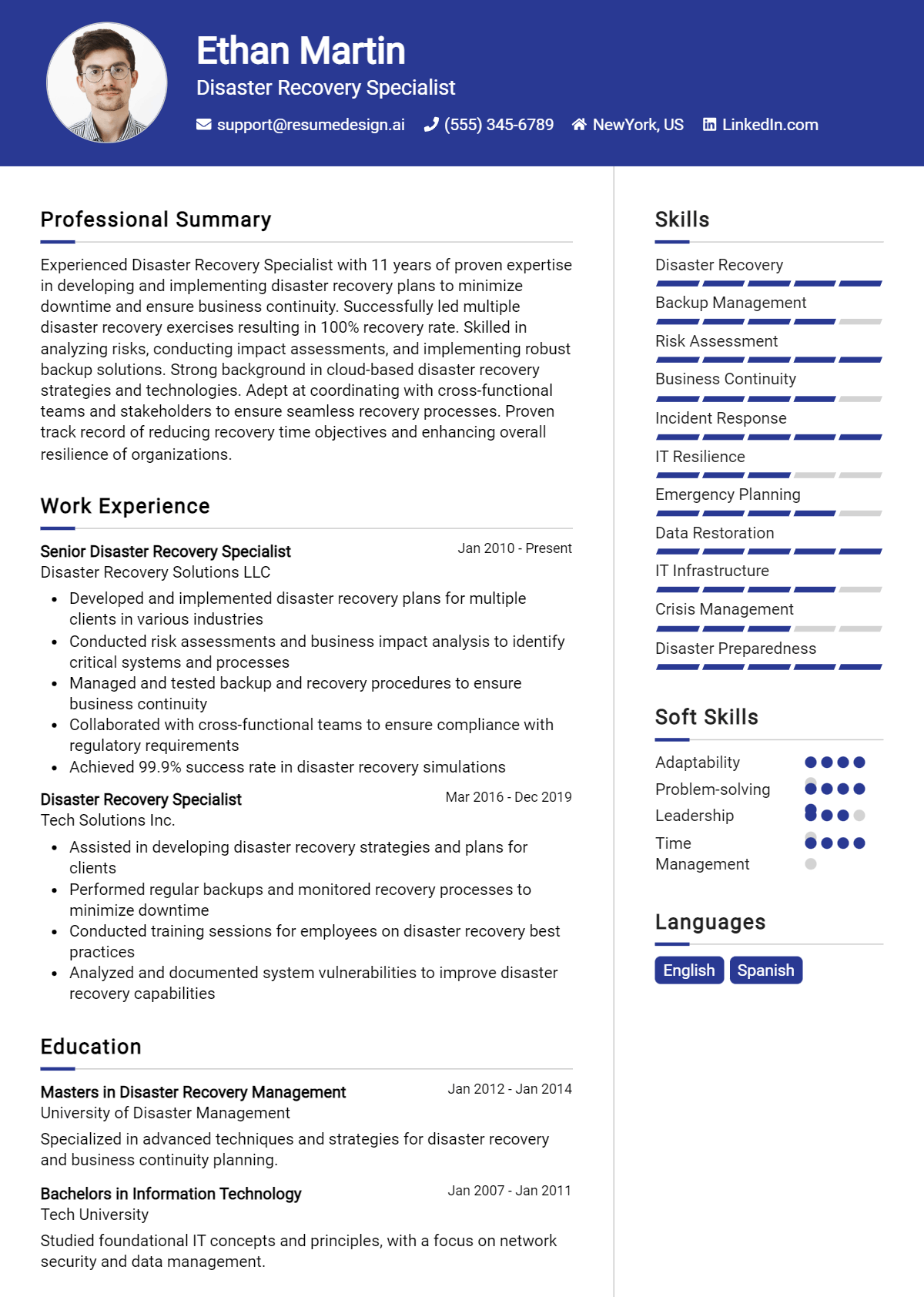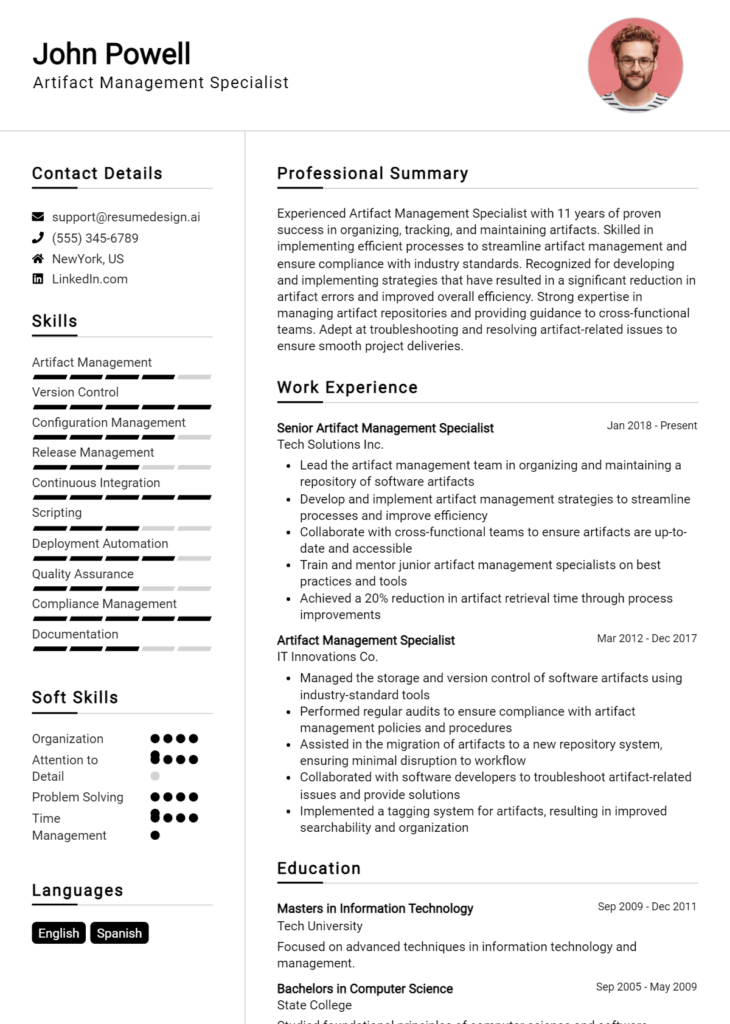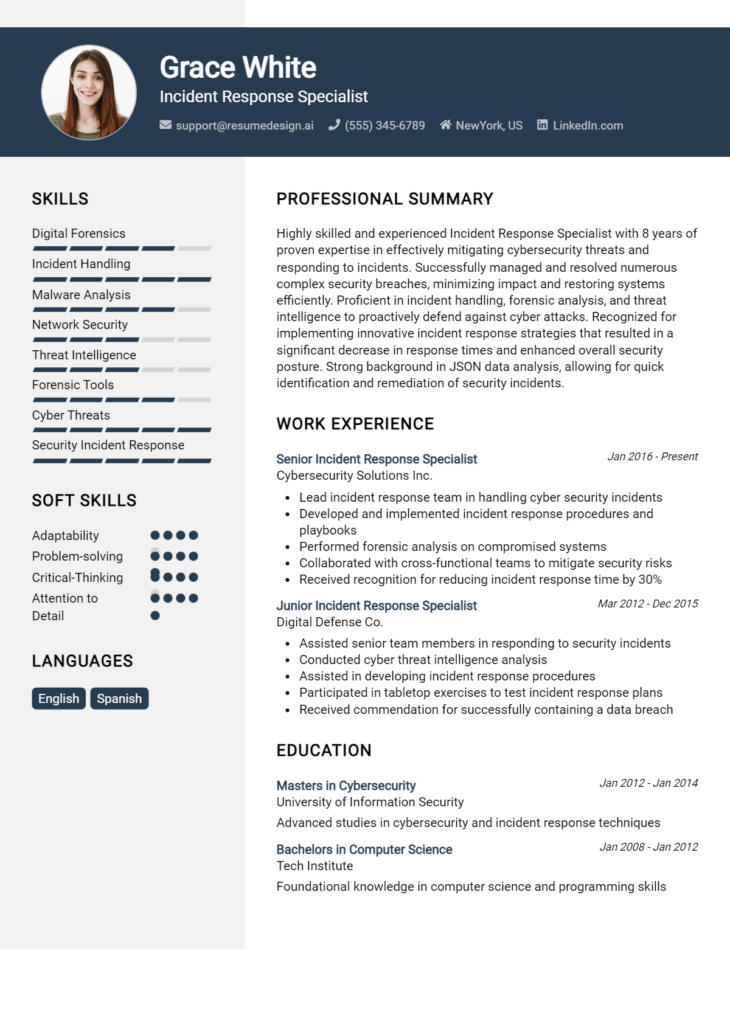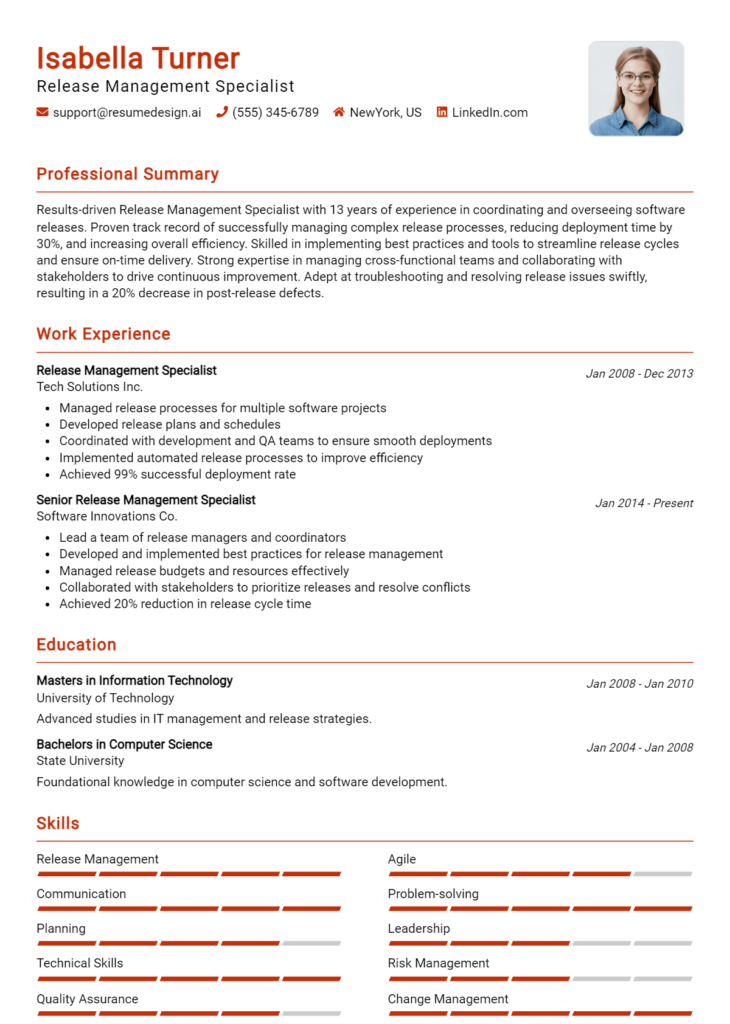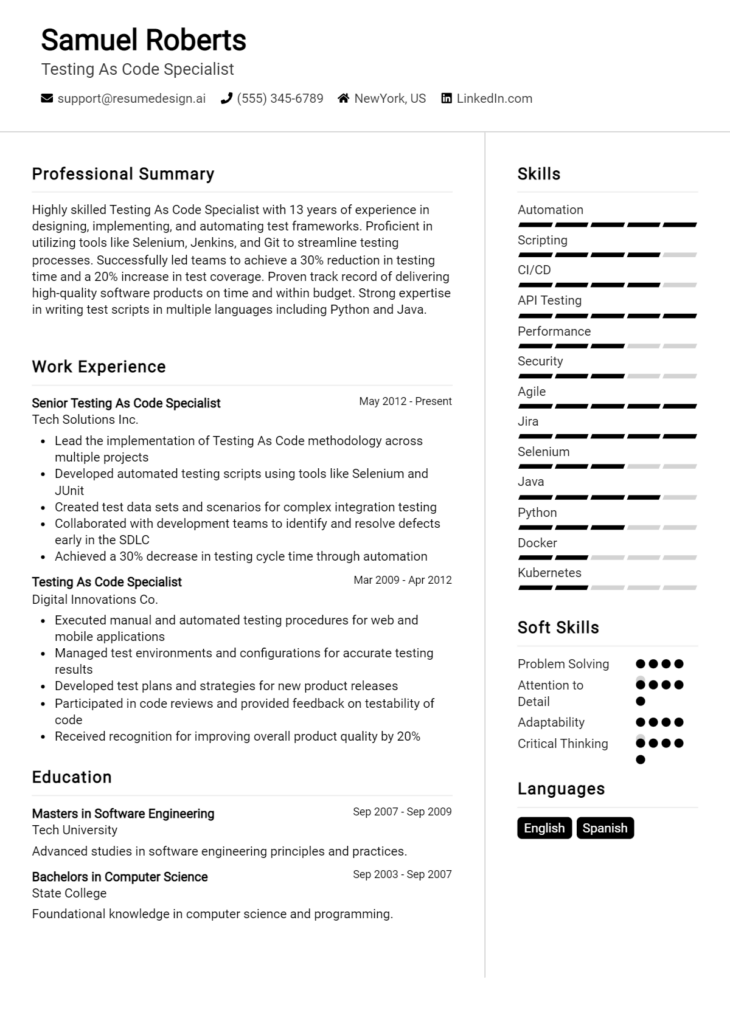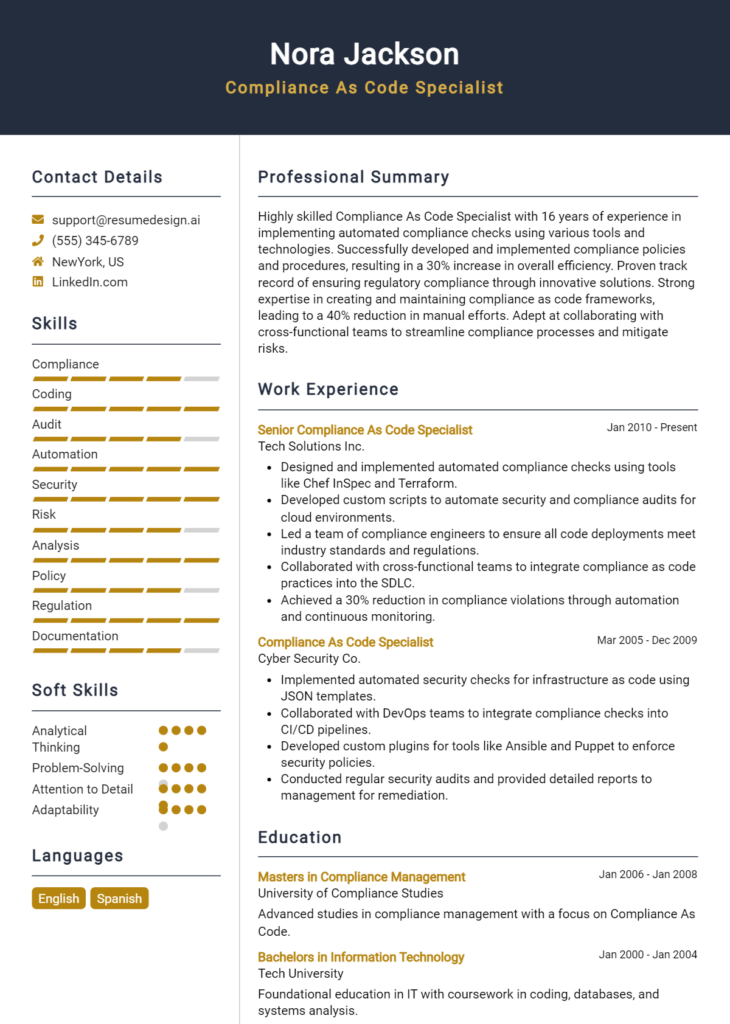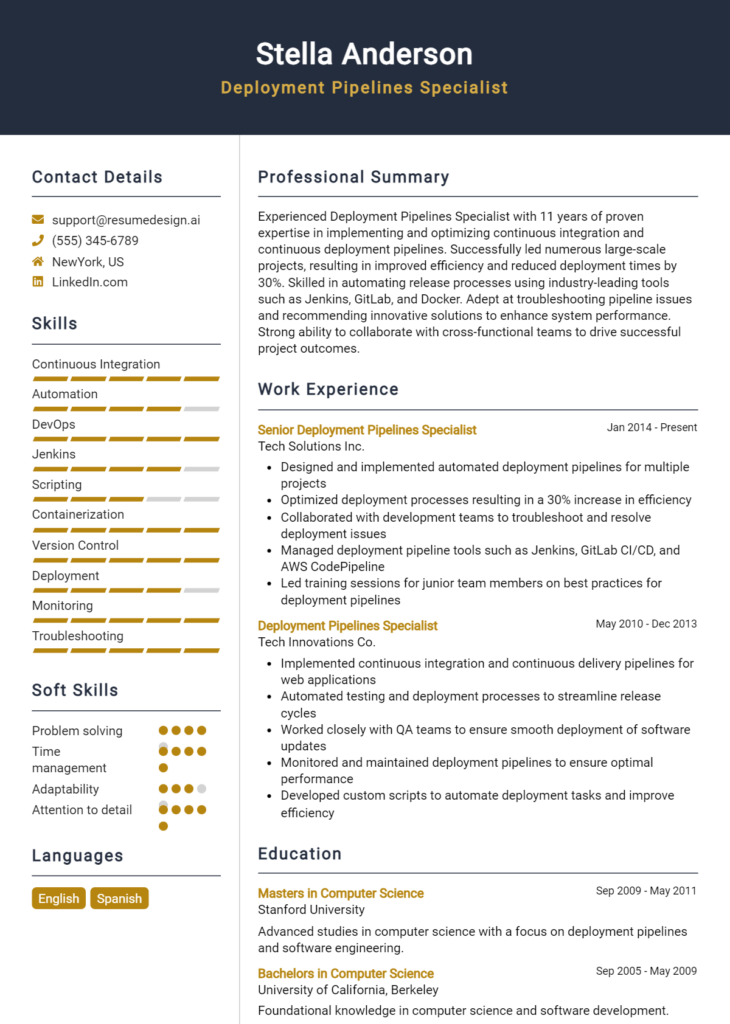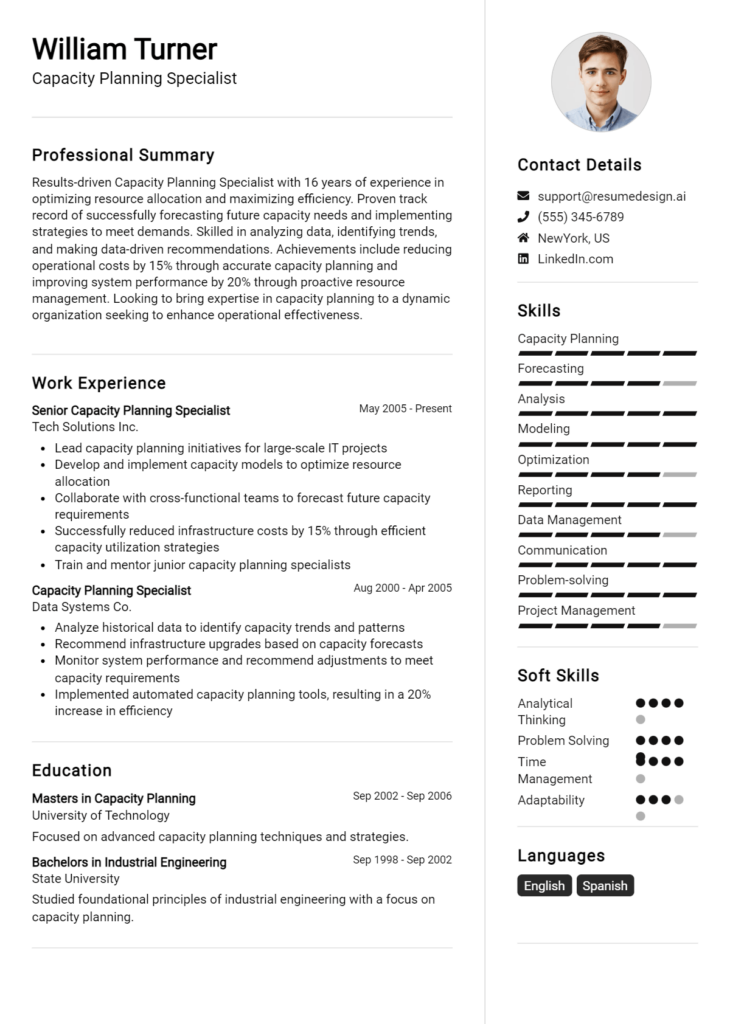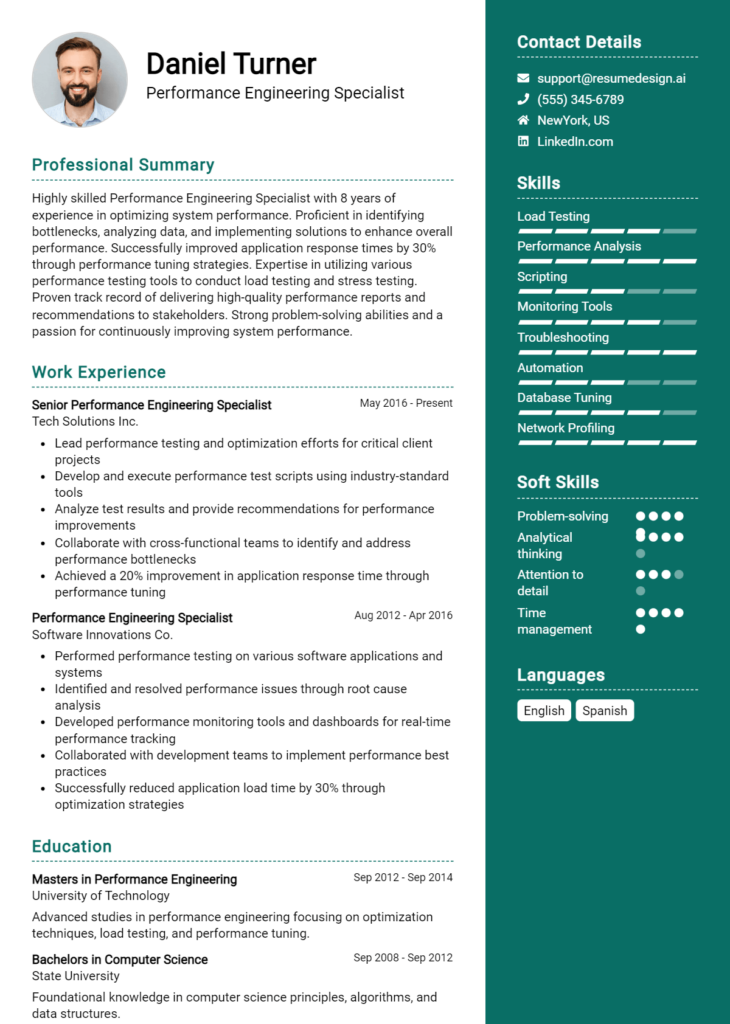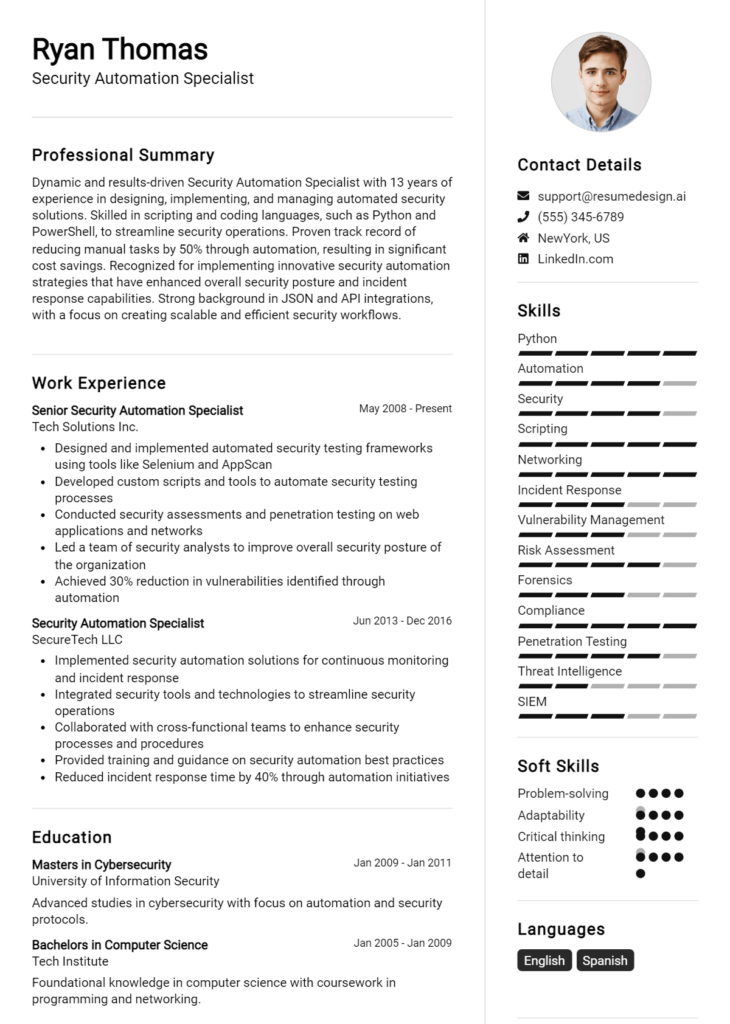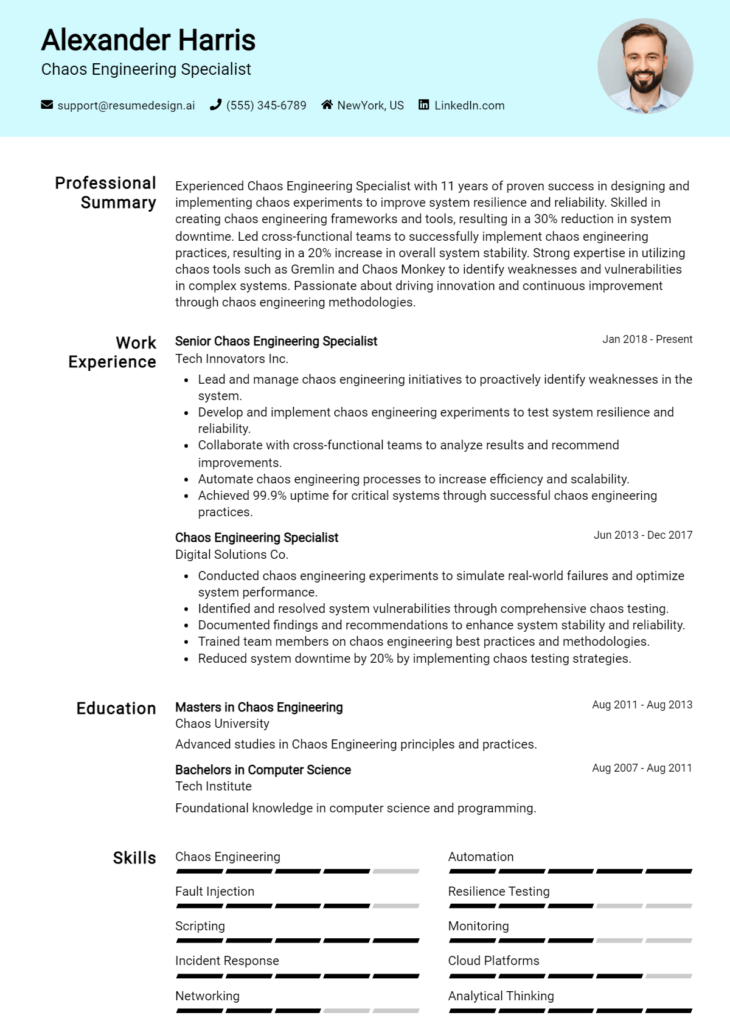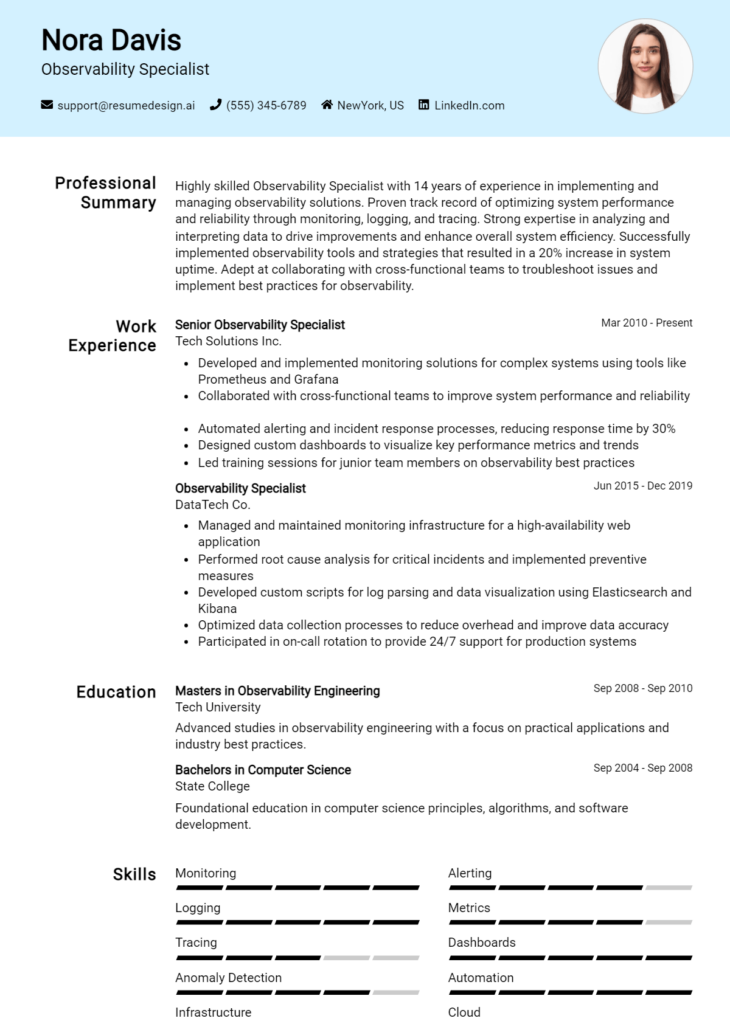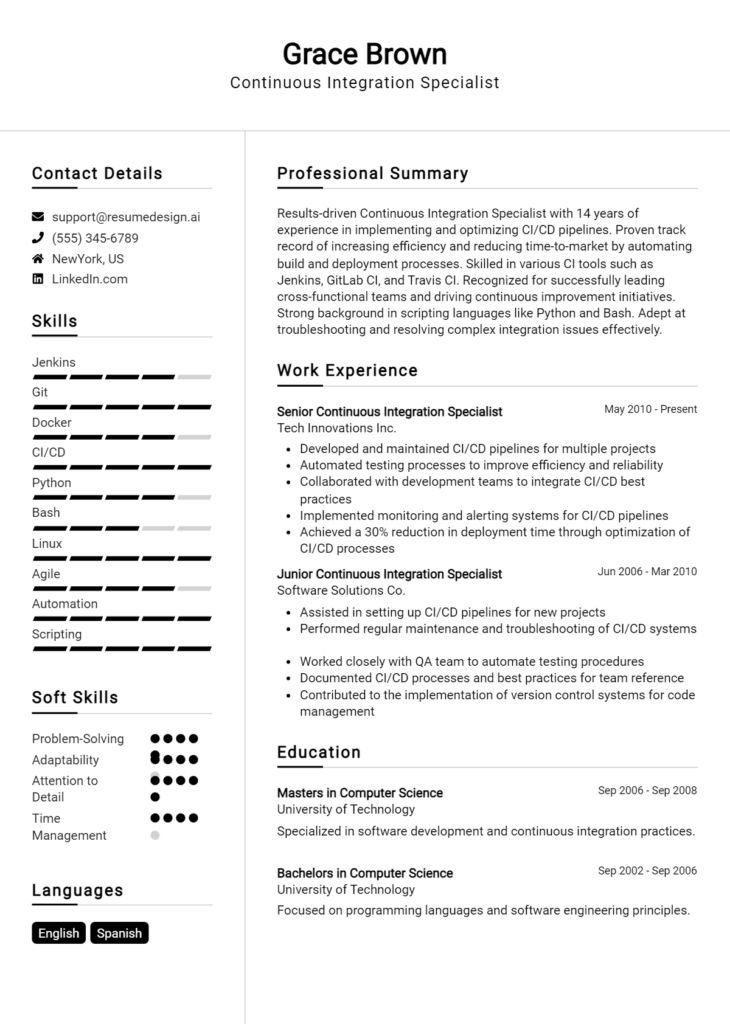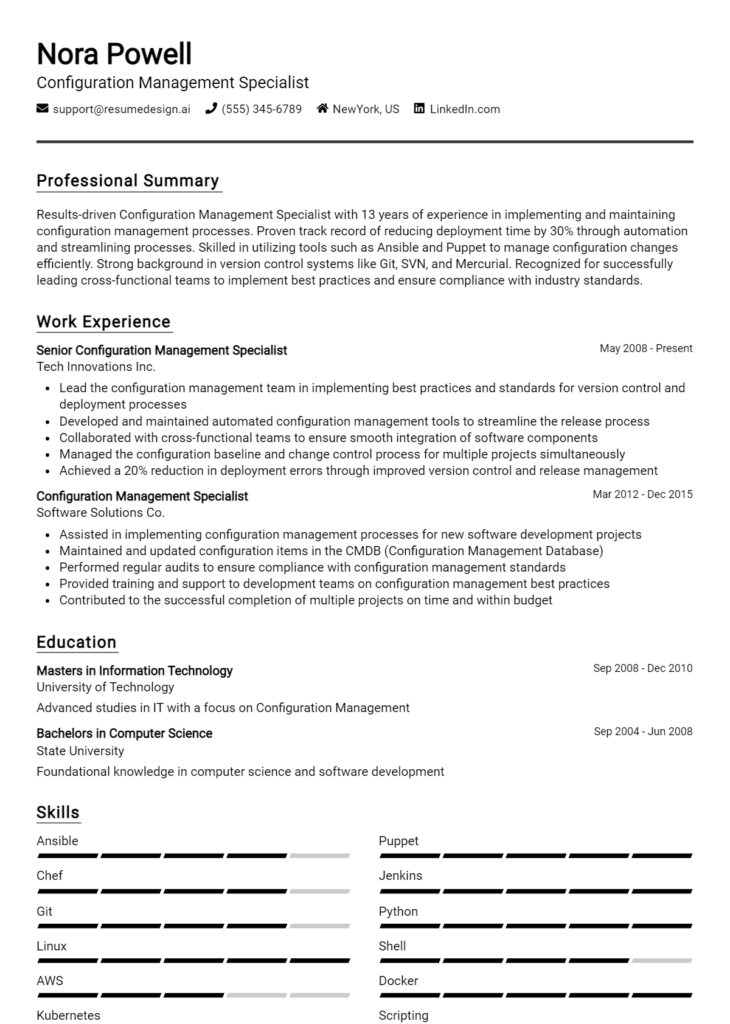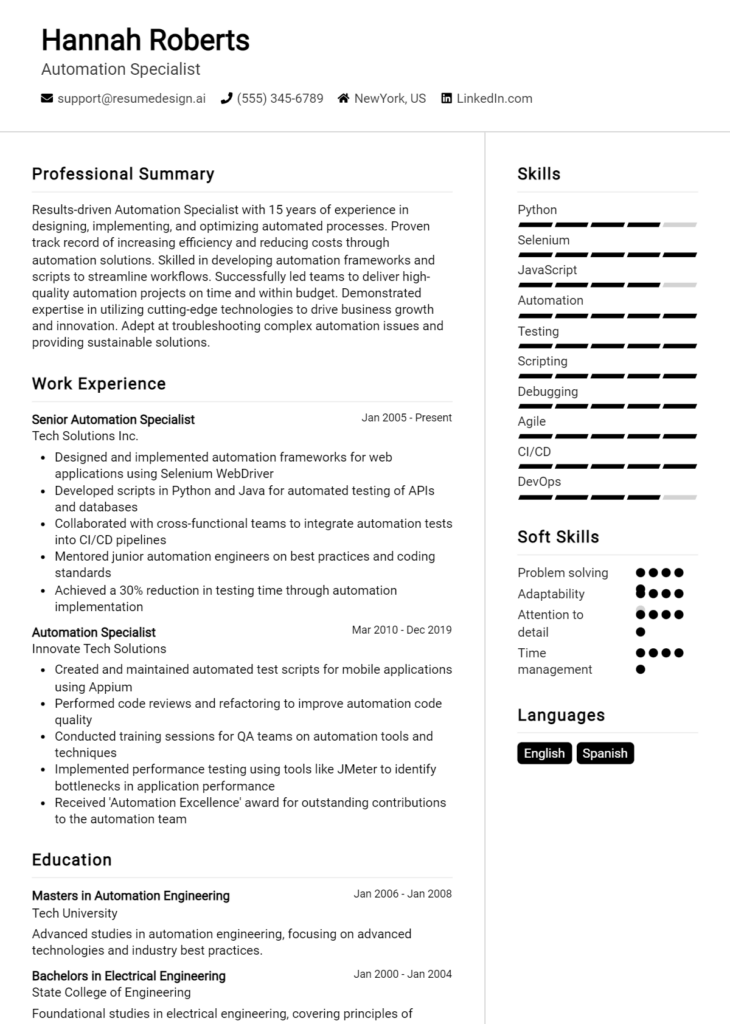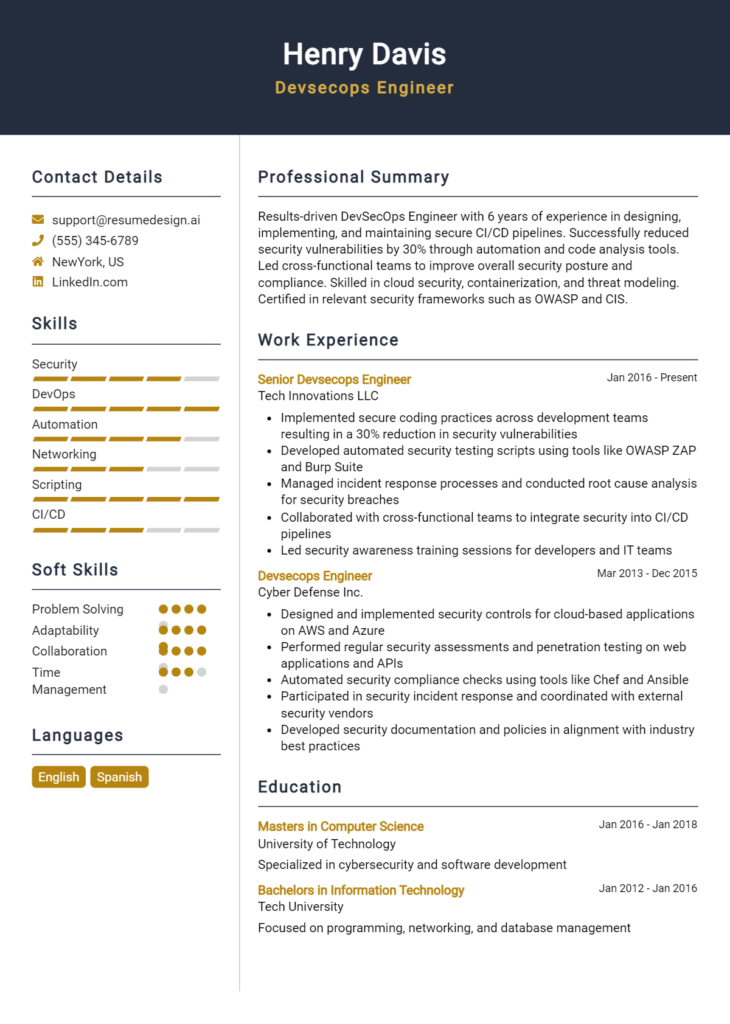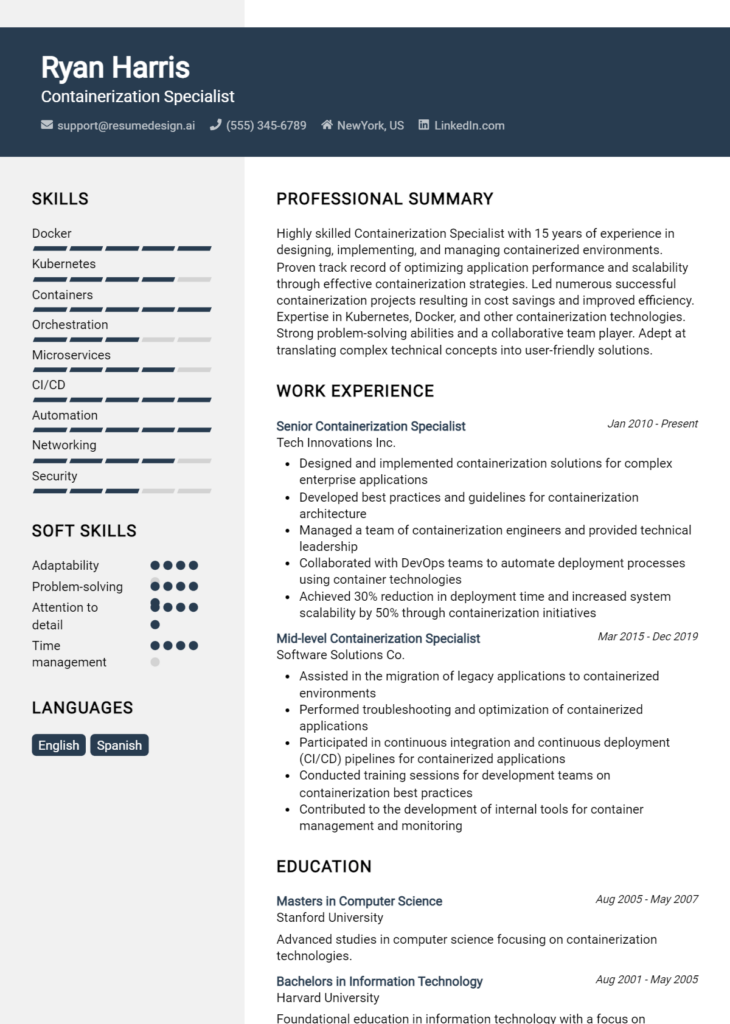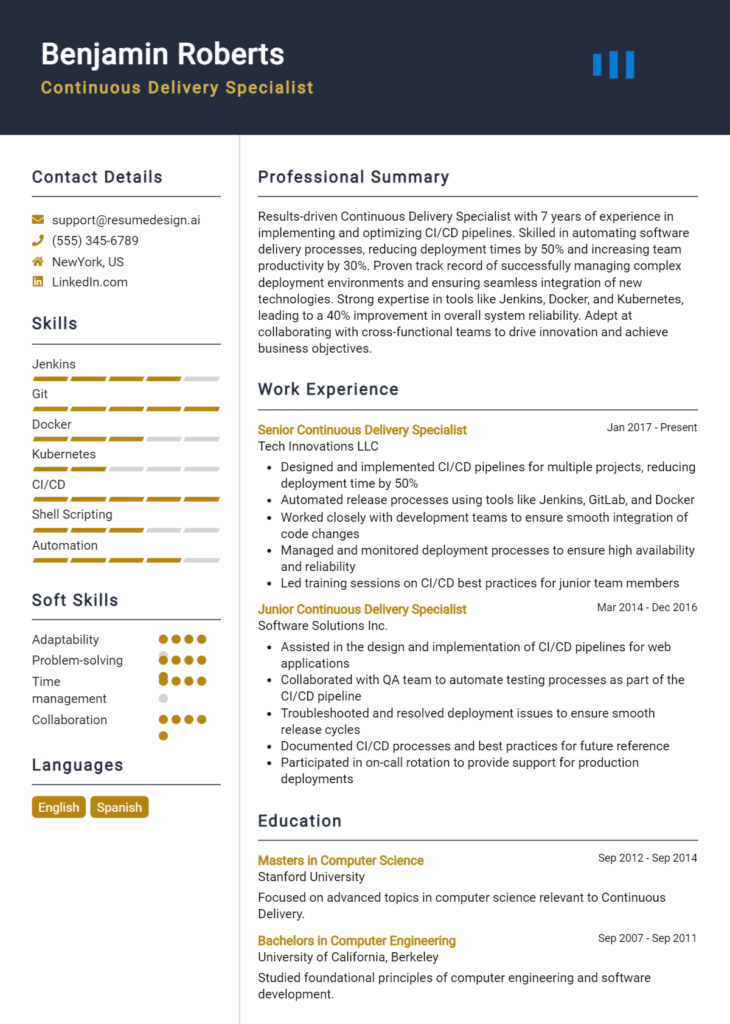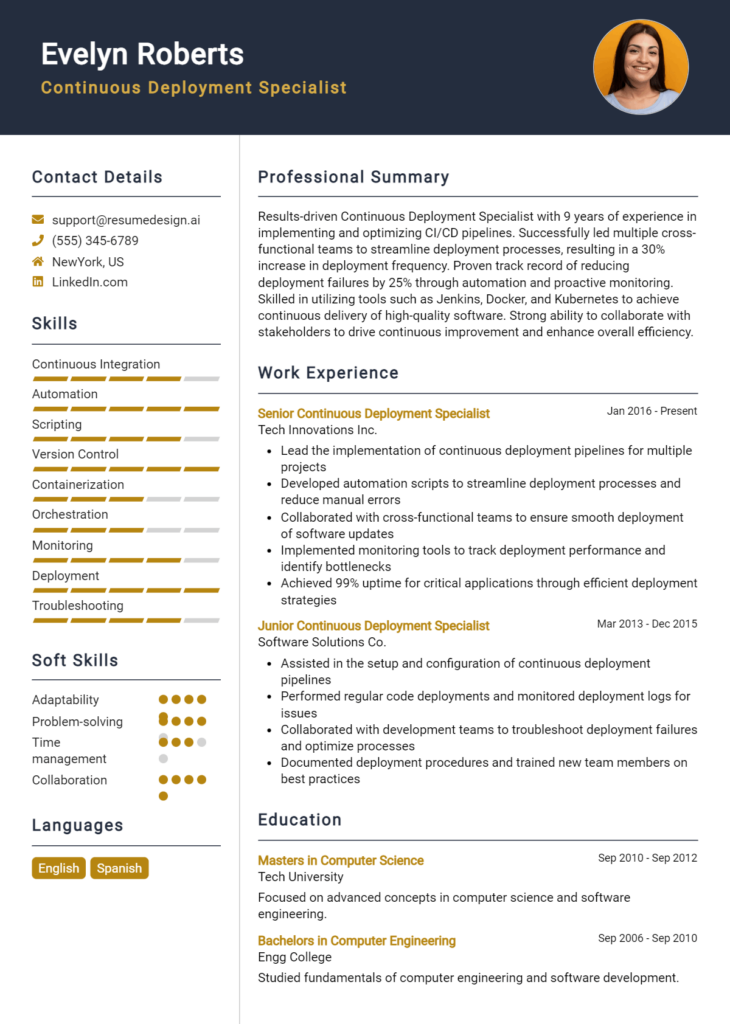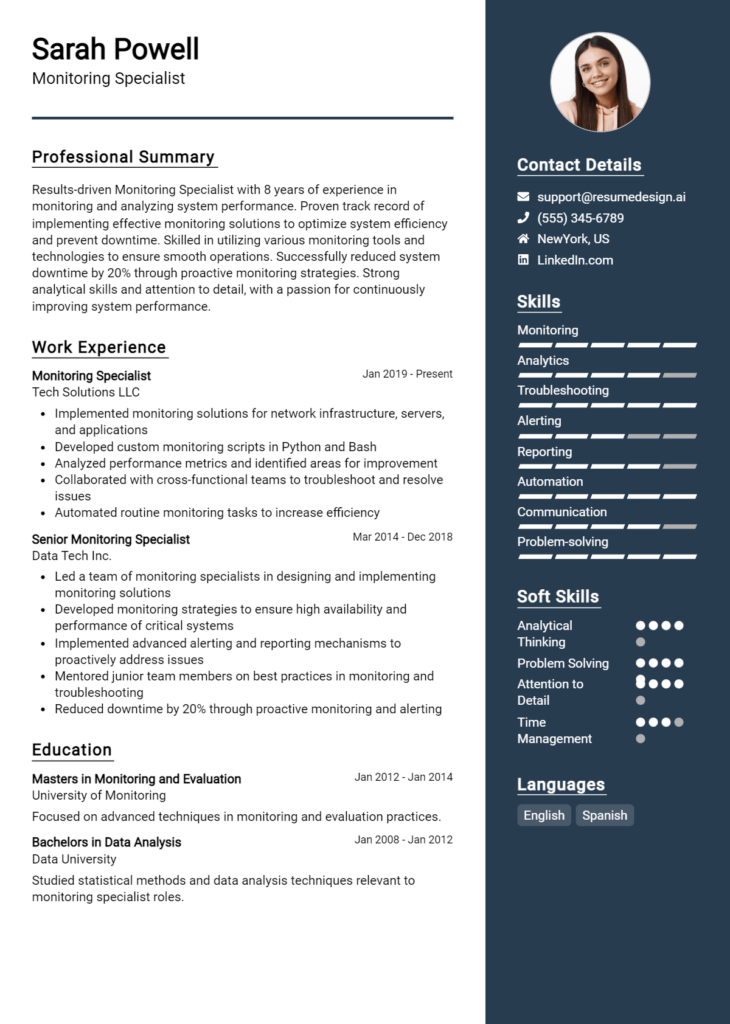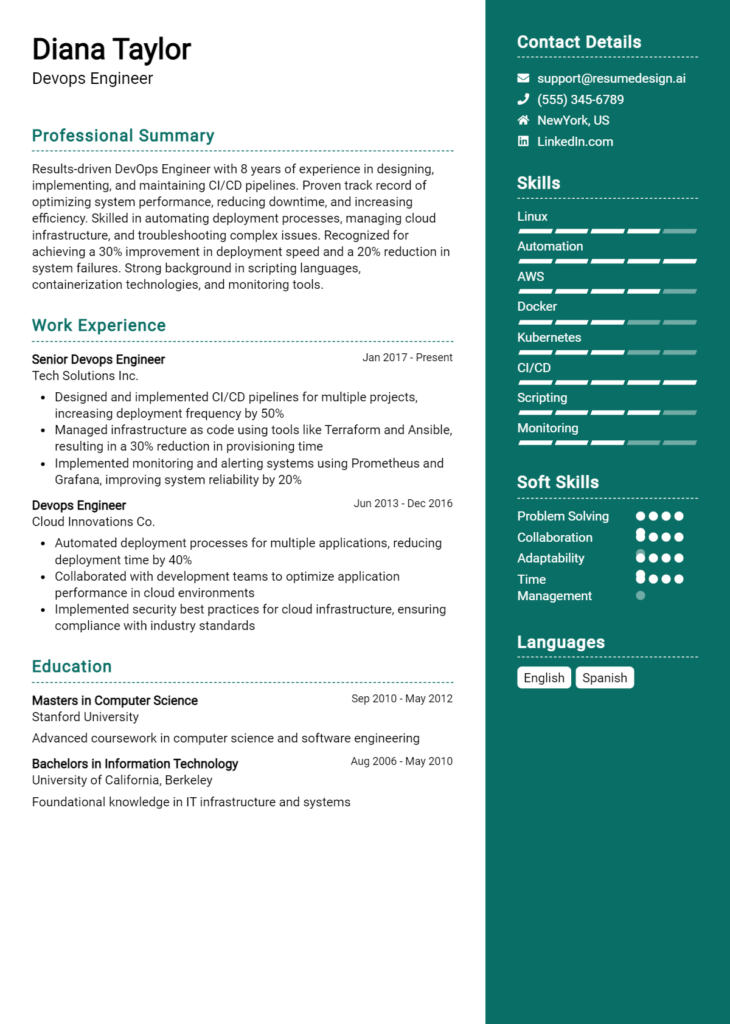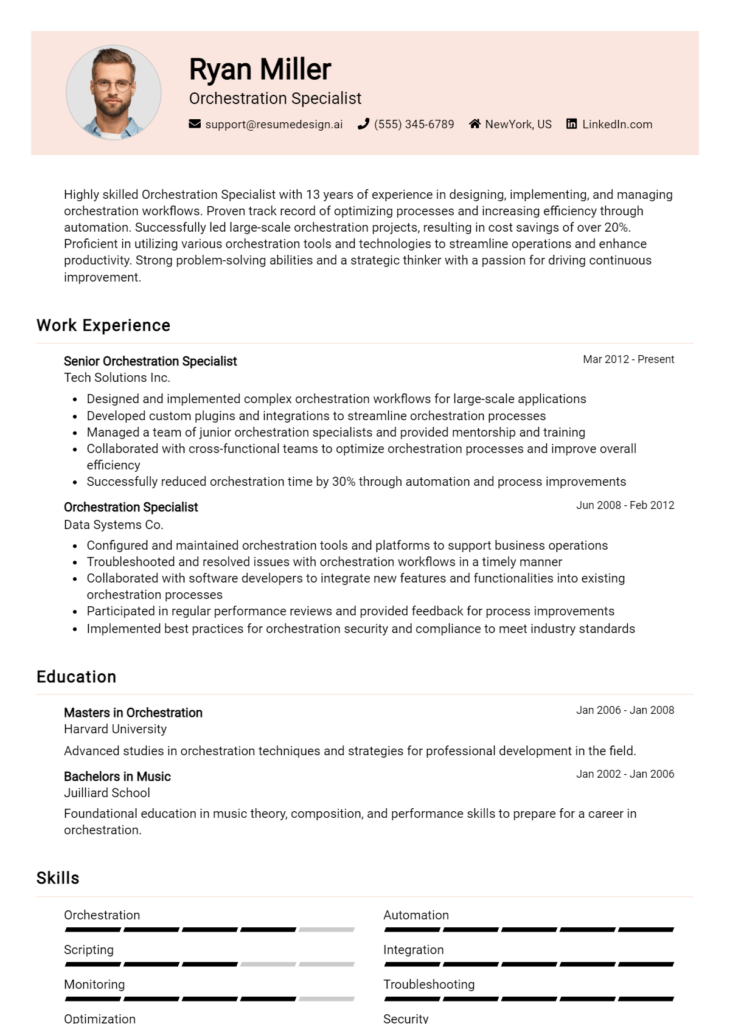Disaster Recovery Specialist Core Responsibilities
A Disaster Recovery Specialist plays a crucial role in ensuring an organization’s resilience against disruptions. Key responsibilities include assessing risks, developing recovery plans, and coordinating training sessions across departments. This role requires strong technical knowledge, operational insight, and exceptional problem-solving skills to effectively bridge gaps between IT, operations, and management. These abilities are vital in achieving the organization’s continuity goals. A well-structured resume can effectively highlight these qualifications, showcasing the candidate's readiness to protect vital assets.
Common Responsibilities Listed on Disaster Recovery Specialist Resume
- Conduct risk assessments and business impact analyses.
- Develop, implement, and maintain disaster recovery plans.
- Coordinate disaster recovery drills and testing exercises.
- Collaborate with IT and operational teams to ensure alignment.
- Review and update recovery procedures based on changes in technology.
- Provide training and support to staff on recovery protocols.
- Monitor and report on recovery plan effectiveness.
- Maintain documentation related to recovery processes.
- Assist in compliance with industry regulations and standards.
- Evaluate new technologies and tools for disaster recovery solutions.
High-Level Resume Tips for Disaster Recovery Specialist Professionals
In the competitive field of disaster recovery, a well-crafted resume is essential for professionals aiming to make a strong first impression. Your resume serves as your personal marketing tool, showcasing not only your skills but also your achievements and contributions to previous roles. As potential employers sift through numerous applications, your resume must stand out by clearly reflecting your expertise in disaster recovery strategies, risk management, and crisis response. This guide will provide practical and actionable tips specifically tailored for Disaster Recovery Specialist professionals, helping you create a resume that effectively communicates your value to prospective employers.
Top Resume Tips for Disaster Recovery Specialist Professionals
- Tailor your resume to the specific job description by incorporating relevant keywords and phrases found in the posting.
- Highlight your relevant experience in disaster recovery planning, execution, and assessment to demonstrate your expertise.
- Quantify your achievements with metrics, such as the percentage of downtime reduced or the number of successful recovery plans implemented.
- Showcase industry-specific skills, including knowledge of compliance regulations, risk assessment methodologies, and recovery technologies.
- Utilize a clear and organized format that enhances readability, making it easy for hiring managers to quickly assess your qualifications.
- Include certifications relevant to disaster recovery, such as Certified Business Continuity Professional (CBCP) or Certified Information Systems Security Professional (CISSP).
- Incorporate examples of successful teamwork and leadership during disaster recovery scenarios to highlight your interpersonal skills.
- Keep your resume concise, ideally one to two pages, focusing on the most relevant information that aligns with the job you are applying for.
- Include a summary statement at the top of your resume that encapsulates your career goals and what you bring to the table as a Disaster Recovery Specialist.
By implementing these tips, you can significantly enhance your resume and increase your chances of landing a job in the Disaster Recovery Specialist field. A well-structured and targeted resume not only highlights your qualifications but also positions you as a strong candidate capable of navigating the complexities of disaster recovery and contributing positively to an organization’s resilience strategy.
Why Resume Headlines & Titles are Important for Disaster Recovery Specialist
In the competitive field of disaster recovery, having a well-crafted resume headline or title is crucial for standing out to potential employers. A strong headline serves as the first impression and can immediately grab the attention of hiring managers, summarizing a candidate's key qualifications in a concise and impactful phrase. It should encapsulate the essence of the candidate's expertise and relevance to the Disaster Recovery Specialist role, ensuring that it aligns with the job description. A compelling headline not only highlights essential skills and experiences but also sets the tone for the rest of the resume, making it a vital component in the job application process.
Best Practices for Crafting Resume Headlines for Disaster Recovery Specialist
- Keep it concise—ideally one sentence or phrase.
- Make it role-specific to align with the job description.
- Highlight key qualifications, such as certifications or years of experience.
- Use action-oriented language to convey impact.
- Avoid jargon; use clear and understandable terms.
- Emphasize your unique value proposition to stand out.
- Incorporate keywords relevant to the disaster recovery industry.
- Be specific about your area of expertise, such as risk assessment or crisis management.
Example Resume Headlines for Disaster Recovery Specialist
Strong Resume Headlines
"Certified Disaster Recovery Specialist with 10+ Years in Crisis Management and Business Continuity Planning"
"Experienced Disaster Recovery Expert Specializing in Risk Assessment and Mitigation Strategies"
“Proven Leader in Disaster Response Operations with a Track Record of Successful Recovery Initiatives”
“Dynamic Disaster Recovery Specialist with Expertise in Data Preservation and Infrastructure Resilience”
Weak Resume Headlines
“Looking for a Job in Disaster Recovery”
“Experienced Professional”
“Disaster Recovery Specialist”
The strong headlines are effective because they clearly articulate the candidate's qualifications and specific expertise, making it easy for hiring managers to see their value at a glance. Each strong headline contains relevant keywords and highlights unique strengths that are critical for the role, creating a compelling narrative about the candidate's potential contributions. In contrast, the weak headlines lack specificity and do not convey any significant information about the candidate, making them forgettable and less impactful. Vague statements fail to capture the attention of employers, who are looking for candidates that stand out in a crowded job market.
Writing an Exceptional Disaster Recovery Specialist Resume Summary
A well-crafted resume summary is crucial for a Disaster Recovery Specialist as it serves as the first impression for hiring managers. This brief yet powerful statement encapsulates the candidate's most relevant skills, experiences, and accomplishments in the field of disaster recovery. An effective summary not only captures attention but also provides a snapshot of the candidate's ability to mitigate risks, develop recovery strategies, and ensure business continuity. By being concise and impactful, the summary should be tailored to align with the specific job the candidate is applying for, making it essential for standing out in a competitive job market.
Best Practices for Writing a Disaster Recovery Specialist Resume Summary
- Quantify achievements where possible, such as recovery time improvements or cost savings.
- Highlight specific skills relevant to disaster recovery, like risk assessment or business continuity planning.
- Tailor the summary to match the job description, using keywords from the posting.
- Keep it concise, ideally within 2-4 sentences.
- Use action verbs to convey a sense of proactivity and achievement.
- Showcase relevant certifications or training that add credibility to your expertise.
- Emphasize your experience with specific tools or methodologies used in disaster recovery.
- Include any leadership roles or team collaboration experiences, as they demonstrate your ability to work effectively in crisis situations.
Example Disaster Recovery Specialist Resume Summaries
Strong Resume Summaries
Results-driven Disaster Recovery Specialist with over 8 years of experience in developing and implementing recovery strategies, achieving a 40% reduction in downtime during critical incidents. Proficient in risk assessment, business continuity planning, and compliance with industry regulations.
Detail-oriented professional with a proven track record of coordinating disaster recovery operations, successfully leading a team that reduced recovery time from 48 hours to 12 hours on average. Certified in ITIL and ISO 22301, with expertise in cloud-based recovery solutions.
Dynamic Disaster Recovery Specialist with extensive experience in designing robust recovery plans for multi-million dollar enterprises. Notable for saving $500K annually through optimized recovery processes and risk management protocols.
Weak Resume Summaries
Experienced Disaster Recovery Specialist looking for opportunities in the field.
Skilled in disaster recovery and able to work in various environments. Interested in making a positive impact.
The strength of the summaries lies in their specificity and quantifiable outcomes. The strong summaries effectively highlight relevant achievements, skills, and experiences that directly relate to the Disaster Recovery Specialist role, providing concrete examples of past successes. In contrast, the weak summaries lack detail and clear results, making them generic and unmemorable, which diminishes the candidate's chances of standing out to potential employers.
Work Experience Section for Disaster Recovery Specialist Resume
The work experience section of a Disaster Recovery Specialist resume is crucial as it serves as a platform to showcase the candidate's technical skills, team management capabilities, and the ability to deliver high-quality disaster recovery solutions. This section provides potential employers with insights into how effectively the candidate can navigate complex recovery scenarios, implement robust strategies, and lead teams to success during critical times. Quantifying achievements—such as recovery time improvements, cost reductions, and successful project completions—along with aligning previous experiences with industry standards, can significantly enhance the candidate's appeal to hiring managers.
Best Practices for Disaster Recovery Specialist Work Experience
- Include specific technical skills relevant to disaster recovery, such as knowledge of recovery frameworks and tools.
- Quantify results whenever possible, such as percentage improvements in recovery times or cost savings achieved.
- Highlight leadership roles and teamwork experiences, emphasizing how collaboration contributed to successful recovery outcomes.
- Utilize industry-specific terminology to align your experience with professional standards and expectations.
- Detail your approach to risk assessment and management, showcasing your problem-solving abilities.
- Demonstrate continuous learning and certifications relevant to disaster recovery practices.
- Tailor your work experience descriptions to match the job description provided by potential employers.
- Include significant projects or exercises where your contributions had a measurable impact on organizational resilience.
Example Work Experiences for Disaster Recovery Specialist
Strong Experiences
- Led a cross-functional team in a major disaster recovery drill, achieving a 30% reduction in recovery time compared to previous exercises.
- Implemented a new data backup solution that decreased data loss incidents by 40%, enhancing overall recovery capabilities.
- Coordinated recovery efforts during a critical outage, successfully restoring services within 2 hours, exceeding the SLA by 50%.
- Designed and executed a comprehensive disaster recovery plan that resulted in a 25% reduction in recovery costs over two fiscal years.
Weak Experiences
- Assisted in disaster recovery efforts without specific contributions or outcomes mentioned.
- Participated in recovery planning meetings but did not detail any specific responsibilities or results.
- Helped with data backups at an unspecified level without quantifying the impact of these efforts.
- Worked on a project related to disaster recovery but did not explain the project's objectives or achievements.
The strong experiences are considered exemplary because they provide clear, quantifiable results and demonstrate leadership, technical expertise, and effective collaboration. They illustrate the candidate's direct contributions to significant outcomes. Conversely, the weak experiences lack specificity and fail to convey measurable impacts or individual responsibilities, making it difficult for employers to assess the candidate's value and capabilities in the disaster recovery domain.
Education and Certifications Section for Disaster Recovery Specialist Resume
The education and certifications section is a critical component of a Disaster Recovery Specialist resume, as it provides a comprehensive overview of the candidate's academic background, industry-specific certifications, and commitment to ongoing professional development. This section serves to reinforce the candidate's expertise and readiness for the role, showcasing relevant coursework and specialized training that align with the demands of disaster recovery and business continuity. By highlighting these credentials, candidates can significantly enhance their credibility and demonstrate their alignment with the job requirements, making them more appealing to potential employers.
Best Practices for Disaster Recovery Specialist Education and Certifications
- Include relevant degrees in fields such as Information Technology, Business Continuity, or Risk Management.
- List industry-recognized certifications, such as Certified Business Continuity Professional (CBCP) or Certified Information Systems Security Professional (CISSP).
- Detail any specialized training related to disaster recovery planning, risk assessment, or crisis management.
- Provide descriptions of relevant coursework that directly applies to disaster recovery strategies and technologies.
- Prioritize recent certifications that reflect the latest industry standards and practices.
- Ensure that all educational entries are formatted consistently and clearly to enhance readability.
- Consider adding any continuous learning efforts, such as recent workshops or seminars attended.
- Highlight any leadership roles in academic or professional organizations related to disaster recovery or emergency management.
Example Education and Certifications for Disaster Recovery Specialist
Strong Examples
- Bachelor of Science in Information Technology, University of XYZ, 2022
- Certified Business Continuity Professional (CBCP), Disaster Recovery Institute International, 2023
- Master’s Certificate in Business Continuity Management, ABC University, 2021
- Relevant Coursework: Disaster Recovery Planning, Risk Management, and Crisis Communication
Weak Examples
- Bachelor of Arts in History, University of ABC, 2010
- Certification in Basic First Aid, Red Cross, 2015
- Diploma in Computer Programming, College of DEF, 2008
- Relevant Coursework: Introduction to Sociology, 2012
The strong examples are considered effective because they directly relate to the skills and knowledge required for a Disaster Recovery Specialist, showcasing both relevant educational credentials and industry-recognized certifications that enhance the candidate's qualifications. In contrast, the weak examples fail to demonstrate relevance to the field, highlighting outdated or unrelated educational backgrounds and certifications that do not contribute to the candidate's expertise in disaster recovery.
Top Skills & Keywords for Disaster Recovery Specialist Resume
In today's volatile environment, the role of a Disaster Recovery Specialist has become increasingly vital for organizations aiming to safeguard their data and ensure business continuity. An effective resume for this position must emphasize both hard and soft skills, as the combination of technical proficiency and interpersonal abilities is essential for navigating complex recovery strategies and collaborating with various teams. Highlighting the right skills not only showcases your expertise but also demonstrates your readiness to tackle challenges head-on, making your application more appealing to potential employers. For a deeper dive into how to effectively showcase your skills, check out these skills resources.
Top Hard & Soft Skills for Disaster Recovery Specialist
Soft Skills
- Problem-solving
- Critical thinking
- Communication
- Team collaboration
- Stress management
- Adaptability
- Attention to detail
- Leadership
- Time management
- Interpersonal skills
Hard Skills
- Risk assessment and management
- Business continuity planning
- Data backup and recovery solutions
- Cloud computing knowledge
- Compliance and regulatory knowledge (e.g., GDPR, HIPAA)
- IT infrastructure knowledge
- Disaster recovery software proficiency
- Network security practices
- Incident response planning
- Technical documentation skills
For more insight into effectively presenting your work experience, ensure that you illustrate these skills with relevant examples and achievements.
Stand Out with a Winning Disaster Recovery Specialist Cover Letter
I am writing to express my interest in the Disaster Recovery Specialist position at [Company Name], as advertised on [Job Board/Company Website]. With a robust background in emergency management, risk assessment, and continuity planning, I am excited about the opportunity to contribute to your organization’s resilience and recovery strategies. My experience in developing and implementing disaster recovery plans has equipped me with the skills necessary to ensure operational continuity and minimize downtime during crises.
In my previous role at [Previous Company Name], I successfully led a team in creating a comprehensive disaster recovery strategy that reduced recovery time by 40%. I coordinated cross-departmental training sessions and simulations, which not only increased awareness of emergency protocols but also fostered a culture of preparedness within the organization. My ability to analyze potential risks and develop tailored response plans allowed the company to navigate various disruptions, from natural disasters to cyber incidents, effectively safeguarding both personnel and assets.
I am particularly drawn to this position at [Company Name] because of your commitment to innovative disaster recovery solutions and the emphasis you place on continuous improvement. I am eager to leverage my expertise in technology integration and process optimization to enhance your existing recovery frameworks. Additionally, my strong communication skills enable me to collaborate with stakeholders at all levels, ensuring that everyone is aligned and prepared to act swiftly in the face of adversity.
Thank you for considering my application. I am enthusiastic about the possibility of joining [Company Name] and contributing to your mission of maintaining a resilient organizational structure. I look forward to the opportunity to discuss how my skills and experiences align with the goals of your disaster recovery team.
Common Mistakes to Avoid in a Disaster Recovery Specialist Resume
When crafting a resume for a Disaster Recovery Specialist position, it's crucial to present your qualifications and experience effectively to stand out in a competitive job market. However, many candidates make common mistakes that can undermine their chances of securing an interview. Understanding these pitfalls can help you create a more compelling and professional resume that highlights your expertise in disaster recovery planning, risk assessment, and business continuity.
Vague Job Descriptions: Failing to provide specific details about previous roles can leave hiring managers unclear about your actual responsibilities and accomplishments. Use quantifiable metrics to illustrate your impact.
Ignoring Relevant Certifications: Not listing industry-recognized certifications, such as Certified Business Continuity Professional (CBCP) or Certified Information Systems Security Professional (CISSP), can weaken your resume. These credentials demonstrate your commitment and expertise in the field.
Lack of Tailoring: Submitting a generic resume for different job applications is a missed opportunity. Tailor your content to reflect the specific skills and experiences that align with each job description.
Overly Technical Language: While technical knowledge is essential in disaster recovery, using jargon can alienate non-technical hiring managers. Strive for clarity and ensure that your resume is accessible to all audiences.
Neglecting Soft Skills: Disaster recovery requires strong communication, leadership, and problem-solving skills. Focusing solely on technical abilities may overlook these essential traits, so be sure to highlight them.
Poor Formatting: A cluttered or overly complicated resume layout can distract from your qualifications. Use clear headings, bullet points, and consistent formatting to enhance readability.
Omitting Soft and Hard Skills: Not including a balanced mix of both types of skills can make your resume feel one-dimensional. Ensure you showcase both technical proficiencies and interpersonal skills.
Failing to Include a Summary Statement: Neglecting to add a concise summary at the beginning of your resume means missing the chance to quickly convey your expertise and career objectives. This section should succinctly capture your qualifications and aspirations.
Conclusion
In this article, we explored the vital role of a Disaster Recovery Specialist in ensuring that organizations can recover from unforeseen disasters effectively. Key responsibilities include developing disaster recovery plans, conducting risk assessments, and coordinating recovery efforts during a crisis. We also discussed the importance of staying updated with the latest industry trends and technologies to enhance recovery strategies.
As you reflect on the insights shared, it's essential to ensure that your resume accurately reflects your skills and experiences in this niche field. A well-crafted resume can significantly impact your job prospects and showcase your expertise to potential employers.
To assist you in this endeavor, consider utilizing various resources available to enhance your resume. You can explore a wide range of resume templates to find a design that fits your professional style. Additionally, a resume builder can streamline the process of creating a polished and tailored resume. If you need inspiration, take a look at resume examples that highlight successful Disaster Recovery Specialists. Lastly, don't forget the importance of a strong introduction with a cover letter template that complements your resume.
Now is the perfect time to review and update your Disaster Recovery Specialist resume. Take advantage of these tools to position yourself for success in your career!

